高一英语情态动词专题复习
- 格式:doc
- 大小:74.00 KB
- 文档页数:11
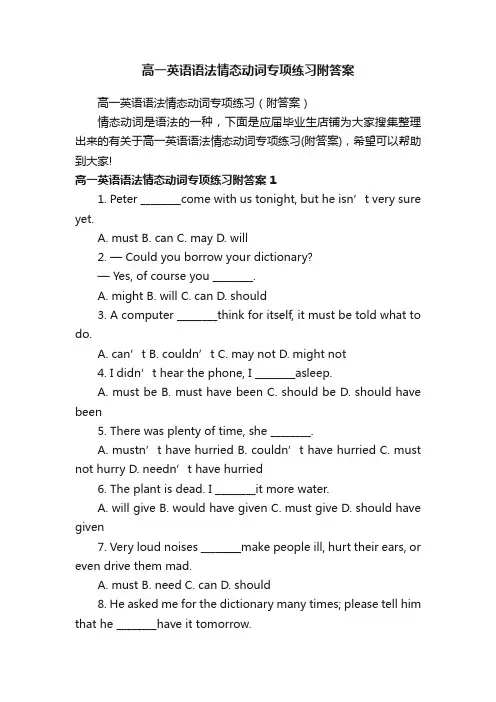
高一英语语法情态动词专项练习附答案高一英语语法情态动词专项练习(附答案)情态动词是语法的一种,下面是应届毕业生店铺为大家搜集整理出来的有关于高一英语语法情态动词专项练习(附答案),希望可以帮助到大家!高一英语语法情态动词专项练习附答案11. Peter ________come with us tonight, but he isn’t very sure yet.A. mustB. canC. mayD. will2. — Could you borrow your dictionary?— Yes, of course you ________.A. mightB. willC. canD. should3. A computer ________think for itself, it must be told what to do.A. can’tB. couldn’tC. may notD. might not4. I didn’t hear the phone, I ________asleep.A. must beB. must have beenC. should beD. should have been5. There was plenty of time, she ________.A. mustn’t have hurriedB. couldn’t have hurriedC. must not hurryD. needn’t have hurried6. The plant is dead. I ________it more water.A. will giveB. would have givenC. must giveD. should have given7. Very loud noises ________make people ill, hurt their ears, or even drive them mad.A. mustB. needC. canD. should8. He asked me for the dictionary many times; please tell him that he ________have it tomorrow.A. mustB. needC. mayD. dare9. — Why is she still standing there?— She ________be waiting for her boyfriend.A. canB. mustC. dareD. need10. Two eyes________ see more than one.A. canB. mustC. mightD. shall11. What ________he mean? ________you tell me?A. can; MayB. can; CanC. may; MayD. must; Should12. How ________he say that his teacher was unfair?A. mustB. mightC. couldD. need13. It ________be very cold in this part.A. canB. oughtC. shallD. dare14. I’d like to ask a question if I ________.A. mustB. willC. mayD. might15. Even in summer the temperature ________suddenly drop below freezing.A. mightB. oughtC. mustD. need16. He decided to join the army so that he ________defend the country.A. may helpB. might helpC. helpsD. helped17. You ________always be talking like that.A. mightn’tB. mayn’tC. can’tD. mustn’t18. The car ________have broke doown just when we were about to start off.A. mustB. couldC. mightD. should19. You ________see him while he is in hospital.A. have betterB. had betterC. would ratherD. had to20. There is a fine sunset; it ________to be a fine day tomorrow.A. oughtB. shouldC. has toD. has better21. You are his father, you ________take care of him.A. mightB. oughtC. ought toD. are able to22. That’s all. It ________be talked about any more.A. needn’tB. mightn’tC. darn’t toD. needn’t to23. The question ________discussing.A. needsB. needC. can beD. must be24. He ________even look out of the window.A. daren’tB. daresn’tC. dared not toD. dares not25. I’m so hungry that I ________find something to eat.A. have toB. wouldC. mayD. can26. All the students ________do their best for the modernization of our country.A. canB. shouldC. mayD. might27. You ________be careful with your homework.A. mustB. have toC. mayD. are used to28. It is getting darker. You ________not go home.A. had betterB. have betterC. would ratherD. would like29. I ________what happened to our school.A. would like knowB. would like to knowC. would like knowingD. would like that I know30. — Would you mind my changing the plan?— ________.A. Oh, no, pleaseB. Yes, I mind notC. No, I wouldD. Yes, I will31. — It ________ be Jack who is in the library.—I’m sure it ________be him, I saw him off at the railway station just two days ago.A. can’t; can’t eB. must; mustn’tC. must; can’tD. can’t; mustn’t32. I ________tell her the truth about his marriage.A. can’t helpB. can’t butC. may not helpD. mustn’t but33. Since she is angry, we ________.A. had better to leave her alongB. should leave her aloneC. would rather to leave her aloneD. must leave her alone34. Look! What you’ve done to me. You ________more careful.A. maybeB. had toC. should have beenD. would be35. ________read the letter for you?A. Would you like meB. Do you want meC. Will you mind meD. Shall I36. He promised he ________not make such silly mistakes.A. wouldB. shouldC. mightD. could37. ________it be true that his father will go abroad?A. CanB. MayC. NeedD. Should38. Those streams are so small that they ________be shown in the maps.A. mustn’tB. may notC. can’tD. may39. — May I use your bike?— ________.A. No, you may notB. No, you m ustn’tC. No, you won’tD. Sorry, I’m afraid not40. — Must I write to her?— No, you ________.A. mustn’tB. shouldn’tC. can’tD. don’t have to41. — Need I start tonight?— Yes, you ________.A. doB. needC. mustD. may42. The old man ________sit for hours watching the ships.A. wouldB. shouldC. was used toD. would rather to43. If the telephone ________ring, please wake me up.A. wouldB. shouldC. willD. might44. I wish they ________stop making remarks about me.A. wouldB. willC. shouldD. shall45. You’re thirsty, aren’t you? ________he get some coffee?A. DoesB. ShallC. WouldD. Let46. Which of the following is wrong?A. That may be true.B. That might be true.C. That can be true.D. That could be true.47. — Would you lend me some money?— Yes, I ________.A. wouldB. willC. canD. may48. He ________ swimming when he was young.A. was used to goB. got used to goC. used to goingD. used to go49. You say you ________ not do it, but I say you ________do it.A. will; shallB. shall; shallC. shall; willD. will; will50. You ________out yesterday without a coat. No wonder you caught cold.A. should have goneB. shouldn’t have goneC. could not have goneD. might have gone51. He ________the 8:30 train because he didn’t leave home until 9:00.A. can’t catchB. couldn’t catchC. may notD. can’t have caught52. You ________us this because we had more than enough.A. needn’t bringB. needn’t have broughtC. mustn’t bringD. couldn’t have brought53. — He learnt the language in three months.— He ________very hard.A. must workB. might have workedC. must have workedD. might work54. — Who told you my telephone number?—I don’t remember. It ________Mary.—It can’t be Mary, she doesn’t know it.A. may have beenB. can have beenC. must beD. can be55. You ________him, why didn’t you?A. ought to thankB. ought have thankedC. ought to have thankedD. ought thank56. I ________have arrived a little earlier, but my car broke down.A. shouldB. couldC. canD. can’t57. — ________we go out for a walk?—Great. Let’s goA. ShallB. WillC. MayD. Should58. Though she was seriously ill, she ________ complete the work in time.A. wouldB. was able toC. was possible toD. might59. — Would you like to play chess with me?— Yes, ________.A. I’dB. I wouldC. I’d likeD. I’d like to60. Tom is late. He ________the wrong bus.A. must takeB. must have takenC. might takeD. could take1—10. CCABD DCCBA 11—20. BCACA BDDBA 21—30. CAAAA BAABA 31—40. CBBCD AACDD 41—50. CABAB CBDAB 51—60. DBCAC BABDB高一英语语法情态动词专项练习附答案21. I __________ you, because I thought I must be wrong.A. dare not askB. dare not to askC. dare not askingD. dare to not ask2. There __________ some flowers in the garden.A. were used to beB. used to beC. uses to beD. used to be having3. “__________ I take it out?”“I′m sorry, you __________.”A. Could …couldn′tB. Might…might notC. Could…canD. M ay…can′t4. You were stupid to climb the tree. You __________ hurt yourself.A. mayB. mightC. willD. might have5. You __________ those letters. Why didn′t you ?A. should postB. should have postedC. must have postedD. ought to post.6. All the lights are on, the Smiths __________ up.A. must getB. is gettingC. must be gettingD. would get7. He __________ lead a horse to the water but he __________ not make it drink.A. will…canB. may…canC. may…daresD. dare…can8. “Need we do this job now?”“Yes,__________.”A. you needB. you shouldC. you mustD. you can9. __________ to have lunch with us today?A. Do you likesB. Would you likeC. Will you likedD. Have you liked10. He said that you __________ watch TV all the evening if you wished .A. mayB. mustC. canD. might11. –Is John coming by train? --He should, but he __________ not. He likes driving his car.A. mustB. canC. needD. may12. Peter __________ come with us tonight, but he isn′t very sure yet.A. mustB. canC. mayD. will13. Michael __________ be a policeman, for he′s much too short.A. needn′tB. can′tC. shouldn′tD. won′t14. I thought you __________ be hungry, so I have brought you some c akes.A. mayB. mightC. canD. could15. I wonder how he __________ that to the teacher.A. dare to sayB. dare sayingC. not dare say D . dared say16. Come on! We __________ hurry because there isn′t much time left.A. mayB. mustC. canD. need17. Amy did best in the English test. She __________ hard last week.A. must have workingB. should have workedC. should workD. must work18. The fire spread through the hotel very quickly but everyone ______ ____ get out.A. had toB. wouldC. couldD. was able to19. –--I stayed at a hotel while in New York. ---Oh, did you? You ____ ______ with Barbara.A. could have stayedB. could stayC. would stayD. m ust have stayed20. It′s nearly seven o′clock. Jack __________ be here at any moment.A. mustB. needC. shouldD. can答案:1.A2.B3.D4.D5.B6.C7.B8.C9.B10.D11.D12.C13.B14.B15.D16.B1 7.A18.D19.A20.高一英语语法情态动词专项练习附答案31. Jean have kept his promise. I wonder why he changed his idea.A. mustB. shouldC. needD. would2. Jane have come to the party, but she not find the exact time.A. could; couldB. might; couldC. should; couldD. should; would3. So many mistakes in your homework! You more careful.A. may beB. had toC. would beD. should have been 4.Her brother be at home now, because he was seen playing basketball in the stadium just now.A. mustn’tB. needn’tC. can’tD. shouldn't5.---I can’t understand why our boss is late. ---He the early bus.A. could missB. may have missedC. can have missedD. might miss6. She didn't answer the phone, she ______ asleep.A. may beB. must beC. should have beenD. must have been7.The little girl’s eyes were red. She ______.A. may cryB. must cryC. must be criedD. must have been crying8.He______ his supper now, for the dining hall is still closed.A. can’t b e havingB. needn’t be havingC. mustn’t be havingD. shouldn't be having9.I parked my bike behind the building, but now it is gone.It ________ .A. may be stolenB. must be stolenC. must have been stolenD.must have stolen10. ______ Mr. Black_______go to work by ferry before the bridge was built?A. Did; used toB. Use; toC. Did; use toD. Does; use to11. The hotel is only a stone’s throw away, you ______ take a bus.A. need not toB. not need toC. don't needD. need not12. I am busy now, _______ my brother do it for you ?A. WillB. ShallC. MustD. May13. ---You needn’t do it right now, need you?---Yes I am afraid I ______ .A. needB. needn’tC. mustD. mustn’t14.My English-Chinese dictionary has disappeared . Who _____ have taken it? (2003年上海春季高考) A. should B. must C.could D. would15. ---The room is so dirty._______ we clean it?----Of course. (2003年北京春季高考)A.Will B. Shall C. Would D. Do16. If you have something important to do, you ______ waste any time.A. needn’tB. mustn’tC. may notD. won’t17. If you want to borrow a football after school, your student card______ here.A. has to leaveB. must leaveC. has to be leftD. must be left18. “ Did you scold him for his carelessness?”“Yes, but _____ it”A. I’d rather not doB. I’d rather not have doneC. I shouldn’t doD. I’d better not do19. “ Don’t get near to it . It is too dangerous!”“_______” .A. Yes, I won’tB. No, I don’tC. No, I can’tD. No,I won’t20. He must be in the classroom, _______ he?A. mustn’tB. can’tC. isn’tD.can21. He________ be in the garden. He must be in the room.A. can’tB. mustn’tC. will notD. may not22. “Do you have to leave now?”“I am very sorry, but I really______.”A. can’tB. haveC. shouldD. must23. “Let’s go to the library, shall we?”“_________?”A. No, I can’tB. Yes, I willC. Yes , thank youD. No, we’d better not24. “Can I take it away?”“ You ______ better not.”A. shouldB. couldC. wouldD. had25. You _______ have brought your camera. They all had theirs with them.A. couldn’tB. needn’tC. wouldn’tD. mustn’t26. See who is there!______it be May?A. MayB. MustC. CanD. Will27. John______ be a basketball player. He is much too short.A. mayB. mustn’tC. can’tD. should28. The Chinese teacher looks so pale. She ______ be ill.A. mustB. mustn’tC. canD. need29. Something______to save our earth. Do you think so?A. can doB. must doC. has to doD. must be done30. Look at what you have done! You ______ be more careful.A. oughtB. canC. wouldD. Should1-5:BADCB 6-10:DDACC 11-15:DBCCB 16-20:BCBDC 21-25:ADDDB 26-30:CCADD高一英语语法情态动词专项练习附答案41. I didn’t see her in the meeting room this morning. She _____ at the meeting.A. mustn’t have spokenB. shouldn’t have spokenC. needn’t have spokenD. couldn’t ha ve spoken2. One ought _____ for what one hasn’t done.A. not to be punishedB. to not be punishedC. to not punishedD. not be punished3. If you really want yourself to be in good health, you must ___ always ___ so much.A. not; be smokingB. not; have smokedC. not; to smokeD. be not; smoking4. With so much work on hand, you _____ to see the game last night.A. mustn’t goB. shouldn’t goC. couldn’t have goneD. shouldn’t have gone5. Most of the students felt rather disappointed at the English party. They say that it ______ better organized.A. had beenB. had to beC. must have beenD. could have been6. I’m surprised that he _____ in the exam.A. should failB. would have failedC. may have failedD. should have failed7. The little girl _____ there alone.A. not dare goB. dares not goC. dare not goD. dare not to go8. “Must we do it now?” “No, you _____.”A. won’tB. needn’tC. can’tD. don’t9. He said he would rather not _____ it right now.A. doingB. to doC. doD. to be doing10. You _____ to the meeting this afternoon if you have something important to do.A. needn’t to comeB. don’t need comeC. don’t need comingD. needn’t come11. Put on more clothes. You _____ be feeling cold with onlya shirt on.A. canB. couldC. wouldD. must12. I _____ play football than baseball.A. would ratherB. had betterC. like betterD. prefer13. I thought you _____ like something to read, so I have brought you some books.A. mayB. mightC. couldD. must14. There was plenty of times. She _____.A. mustn’t have hurriedB. couldn’t have hurriedC. must not hurryD. needn’t have hurried15. The plant is dead. I _____ it more water.A. will giveB. would have givenC. must giveD. should have given16. You _____ return the book now. You can keep it till next week if you like.A. can’tB. mustn’tC. needn’tD. may not17. It’s still early, you _____.A. mustn’t hurryB. wouldn’t hurryC. may not hurryD. don’t have to hurry18. Please open the window, _____?A. can’t youB. aren’t youC. do youD. will you19. We _____ for her because she never came.A. mustn’t have waitedB. shouldn’t have waitedC. mustn’t waitD. needn’t wait20. — May I stop here? — No, you _____.A. mustn’tB. might notC. needn’tD. won’t21. It’s a fine day. Let’s go fishing, _____.A. won’t weB. will weC. don’t weD. shall we22. I didn’t see her in the meeting room this morning. She _____ at the meeting.A. mustn’t have spokenB. shouldn’t have spokenC. needn’t have spokenD. couldn’t have spoken23. —Please don’t make a noise.—_____. I’ll be as quiet as a mouse.A. Yes, I won’tB. No, I won’tC. No, I willD. Yes, I will24. The young man has made so much noise that he _____ not have been allowed to attend the concert.A. couldB. mustC. wouldD. should25. — Where is John? — He _____ in the library.A. should beB. must beC. can beD. must have been26. Since the road is wet this morning, _____ last night.A. it must rainB. it must be rainingC. it must have rainedD. it must have been rain27. — Will your brother stay home tonight?—I’m not quite sure. He _____ to the cinema tonight.A. must goB. can goC. may goD. may be going28. She’s already two hours late. What ______ to her?A. can have happenedB. may have happenedC. should have happenedD. must happen29. You must be a writer, _____?A. mustn’t youB. are youC. must youD. aren’t you30. I got up early that morning, but I _____ so because I had no work to do.A. mustn’t have doneB. didn’t need to doC. needn’t have doneD. can’t have done31. He _____ have come here yesterday, but he didn’t.A. couldB. shouldC. ought toD. allthe above32. I missed the last bus, so I _____ go home on foot.A. mustB. have toC. mayD. had to33. He ought to win the first prize, _____ he?A. oughtn’tB. shouldn’tC. mustn’tD. both A and B34. Everyone _____ do his best for the modernizations of our country.A. canB. mayC. shouldD. might35. Let’s clean our classroom, _____?A. will youB. don’t weC. shall weD. do you36. Let us play basketball, ______?A. will youB. don’t weC. shall weD. do you37. He asked me for this book many times. Please tell him that he_____ have it tomorrow.A. mustB. mayC. shallD. both B and C38. “Your phone number again? I _____ quite catch it.” “It’s 9568442.”A. didn’tB. couldn’tC. don’tD. can’t39. Mother _____ us stories when we were children.A. was used to tellB. is used to tellingC. used to tellD. used to telling40. She would rather _____ more money on books _____ on clothes.A. cost … notB. to spare … don’tC. pay … thanD. spend … than答案:1-5 DAADD 6-10 DCBCD 11-15DABDD 16-20 CDDBA 21-25DDBDB 26-30CCADC31-35 DDDCC 36-40ADACD【高一英语语法情态动词专项练习(附答案)】。
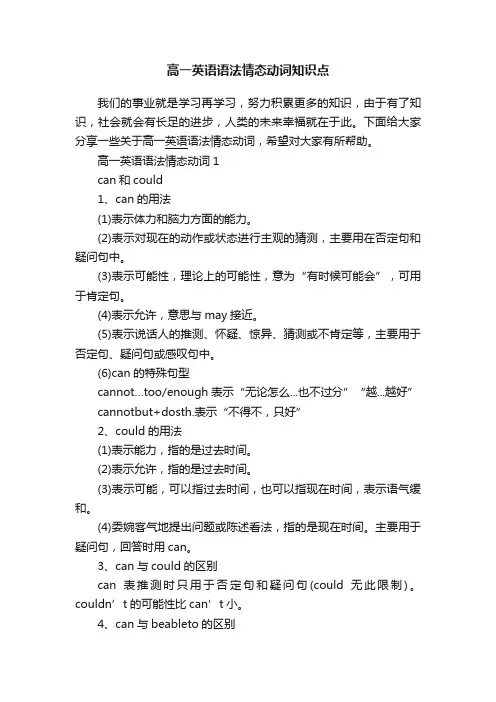
高一英语语法情态动词知识点我们的事业就是学习再学习,努力积累更多的知识,由于有了知识,社会就会有长足的进步,人类的未来幸福就在于此。
下面给大家分享一些关于高一英语语法情态动词,希望对大家有所帮助。
高一英语语法情态动词1can和could1、can的用法(1)表示体力和脑力方面的能力。
(2)表示对现在的动作或状态进行主观的猜测,主要用在否定句和疑问句中。
(3)表示可能性,理论上的可能性,意为“有时候可能会”,可用于肯定句。
(4)表示允许,意思与may接近。
(5)表示说话人的推测、怀疑、惊异、猜测或不肯定等,主要用于否定句、疑问句或感叹句中。
(6)can的特殊句型cannot…too/enough表示“无论怎么...也不过分”“越...越好”cannotbut+dosth.表示“不得不,只好”2、could的用法(1)表示能力,指的是过去时间。
(2)表示允许,指的是过去时间。
(3)表示可能,可以指过去时间,也可以指现在时间,表示语气缓和。
(4)委婉客气地提出问题或陈述看法,指的是现在时间。
主要用于疑问句,回答时用can。
3、can与could的区别can表推测时只用于否定句和疑问句(could无此限制)。
couldn’t的可能性比can’t小。
4、can与beableto的区别(1)现在时:无区别,但后者不常用。
(2)完成时;can没有完成时,此时要用have(has,had)beenableto。
(3)将来时:can没有将来时,要用willbeableto。
(4)过去时:could表示一般能力,was/wereableto表示在具体场合通过努力成功做成某事的能力。
高一英语语法情态动词2二、may和might1、may的用法(1)表示询问或说明一件事可不可以做。
(2)表示一件事或许会发生或某种情况可能会存在,通常用在肯定句和否定句中。
注意:表示可能性时,can’t语气强,表示“不可能”,maynot语气弱,表示“可能不”。
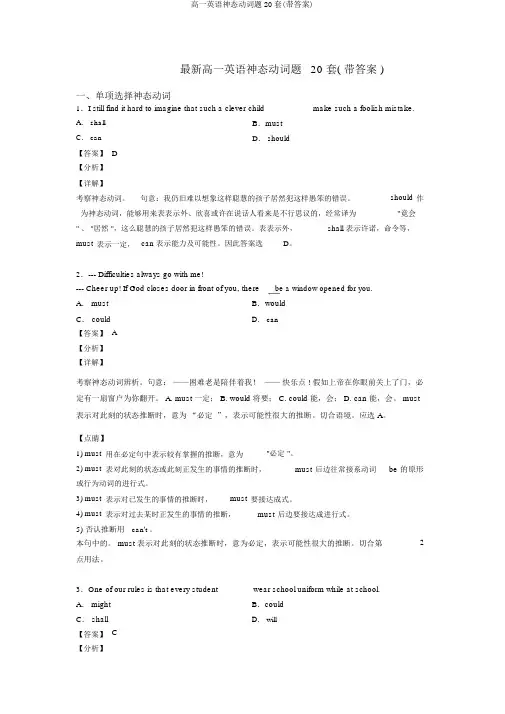
最新高一英语神态动词题20 套( 带答案 )一、单项选择神态动词1.I still find it hard to imagine that such a clever child __________ make such a foolish mistake. A. shall B.mustC. can D. should【答案】D【分析】【详解】考察神态动词。
句意:我仍旧难以想象这样聪慧的孩子居然犯这样愚笨的错误。
should作为神态动词,能够用来表表示外、欣喜或许在说话人看来是不行思议的,经常译为"竟会" 、 "居然 ",这么聪慧的孩子居然犯这样愚笨的错误。
表表示外,shall 表示许诺,命令等,must表示一定,can 表示能力及可能性。
因此答案选D。
2.--- Difficulties always go with me!--- Cheer up! If God closes door in front of you, there be a window opened for you.A. must B.wouldC. could D. can【答案】A【分析】【详解】考察神态动词辨析。
句意:——困难老是陪伴着我!——快乐点 ! 假如上帝在你眼前关上了门,必定有一扇窗户为你翻开。
A. must 一定; B. would 将要; C. could 能,会; D. can 能,会。
must 表示对此刻的状态推断时,意为“必定”,表示可能性很大的推断。
切合语境。
应选 A。
【点睛】1) must用在必定句中表示较有掌握的推断,意为"必定 "。
2) must表对此刻的状态或此刻正发生的事情的推断时,must后边往常接系动词be 的原形或行为动词的进行式。
3) must表示对已发生的事情的推断时,must要接达成式。
4) must表示对过去某时正发生的事情的推断,must后边要接达成进行式。
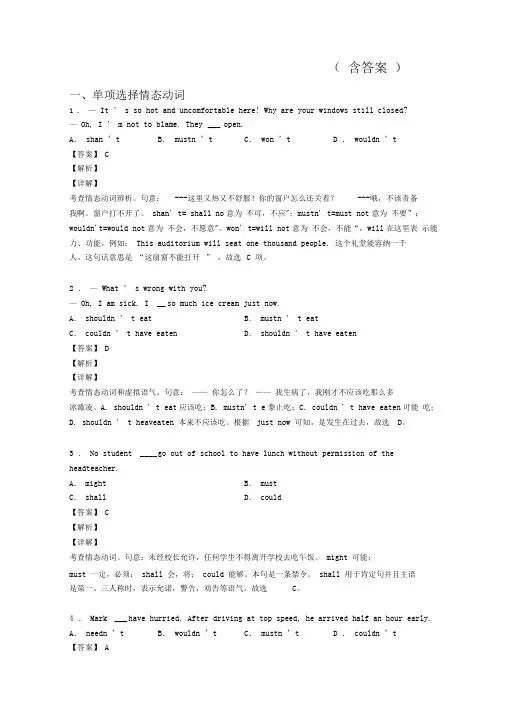
(含答案)一、单项选择情态动词1.—It ’ s so hot and uncomfortable here! Why are your windows still closed? —Oh, I ’ m not to blame. They ___ open.A. shan ’t B. mustn ’t C. won ’t D . wouldn ’t【答案】C【解析】【详解】考查情态动词辨析。
句意:---这里又热又不舒服!你的窗户怎么还关着?---哦,不该责备我啊。
窗户打不开了。
shan' t= shall no意为不可,不应";mustn' t=must not意为不要”;wouldn't=would not意为不会,不愿意"。
won' t=will not意为不会,不能“,will在这里表示能力、功能。
例如:This auditorium will seat one thousand people. 这个礼堂能容纳一千人。
这句话意思是“这扇窗不能打开” ,故选 C 项。
2.—What ’ s wrong with you?—Oh, I am sick. I __ so much ice cream just now.A.shouldn ’ t eat B.mustn ’ t eatC.couldn ’ t have eaten D.shouldn ’ t have eaten【答案】D【解析】【详解】考查情态动词和虚拟语气。
句意:——你怎么了?——我生病了,我刚才不应该吃那么多冰激凌。
A. shouldn ' t eat应该吃;B. mustn' t e豢止吃;C. couldn ' t have eaten可能吃;D. shouldn ’ t heaveaten 本来不应该吃。
根据just now 可知,是发生在过去,故选D。
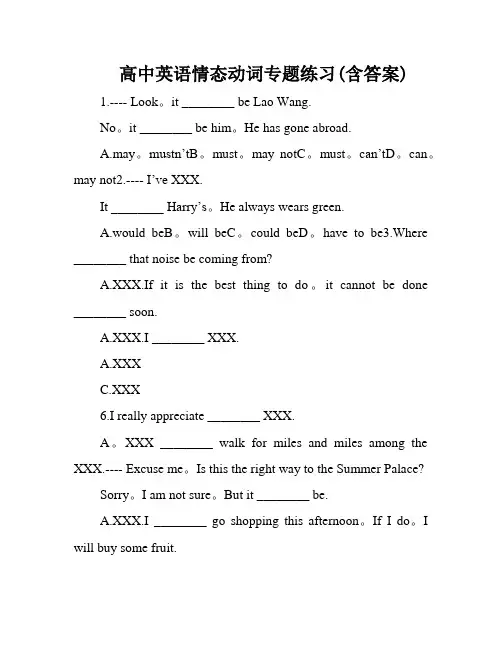
高中英语情态动词专题练习(含答案)1.---- Look。
it ________ be Lao Wang.No。
it ________ be him。
He has gone abroad.A.may。
mustn’tB。
must。
may notC。
must。
can’tD。
can。
may not2.---- I’ve XXX.It ________ Harry’s。
He always wears green.A.would beB。
will beC。
could beD。
have to be3.Where ________ that noise be coming from?A.XXX.If it is the best thing to do。
it cannot be done ________ soon.A.XXX.I ________ XXX.A.XXXC.XXX6.I really appreciate ________ XXX.A。
XXX ________ walk for miles and miles among the XXX.---- Excuse me。
Is this the right way to the Summer Palace?Sorry。
I am not sure。
But it ________ be.A.XXX.I ________ go shopping this afternoon。
If I do。
I will buy some fruit.A。
XXX ________ always help us out financially when XXX.A。
XXX。
---- Who is the girl standing over there?Well。
if you ________ know。
her name is Mabel.A.XXX ________ you always leave your dirty clothes in the bedroom.A。
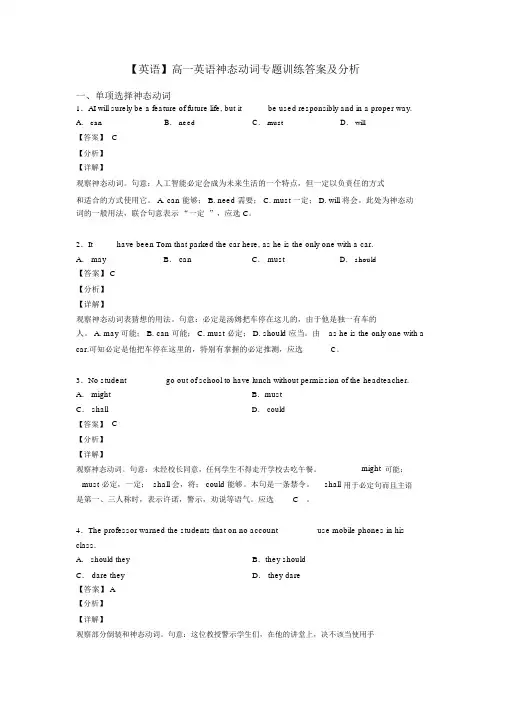
【英语】高一英语神态动词专题训练答案及分析一、单项选择神态动词1.AI will surely be a feature of future life, but it _____ be used responsibly and in a proper way. A. can B. need C. must D. will【答案】C【分析】【详解】观察神态动词。
句意:人工智能必定会成为未来生活的一个特点,但一定以负责任的方式和适合的方式使用它。
A. can 能够; B. need 需要; C. must 一定; D. will 将会。
此处为神态动词的一般用法,联合句意表示“一定”,应选 C。
2.It_____ have been Tom that parked the car here, as he is the only one with a car.A. may B. can C. must D. should【答案】 C【分析】【详解】观察神态动词表猜想的用法。
句意:必定是汤姆把车停在这儿的,由于他是独一有车的人。
A. may 可能; B. can 可能; C. must 必定; D. should 应当。
由as he is the only one with a car.可知必定是他把车停在这里的,特别有掌握的必定推测,应选C。
3.No student ________ go out of school to have lunch without permission of the headteacher. A. might B.mustC. shall D. could【答案】C【分析】【详解】观察神态动词。
句意:未经校长同意,任何学生不得走开学校去吃午餐。
might可能;must 必定,一定; shall 会,将; could 能够。
本句是一条禁令。
是第一、三人称时,表示许诺,警示,劝说等语气。
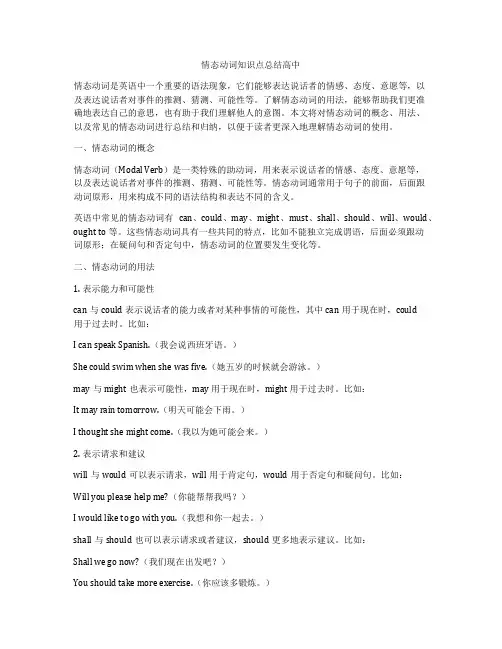
情态动词知识点总结高中情态动词是英语中一个重要的语法现象,它们能够表达说话者的情感、态度、意愿等,以及表达说话者对事件的推测、猜测、可能性等。
了解情态动词的用法,能够帮助我们更准确地表达自己的意思,也有助于我们理解他人的意图。
本文将对情态动词的概念、用法、以及常见的情态动词进行总结和归纳,以便于读者更深入地理解情态动词的使用。
一、情态动词的概念情态动词(Modal Verb)是一类特殊的助动词,用来表示说话者的情感、态度、意愿等,以及表达说话者对事件的推测、猜测、可能性等。
情态动词通常用于句子的前面,后面跟动词原形,用来构成不同的语法结构和表达不同的含义。
英语中常见的情态动词有can、could、may、might、must、shall、should、will、would、ought to等。
这些情态动词具有一些共同的特点,比如不能独立完成谓语,后面必须跟动词原形;在疑问句和否定句中,情态动词的位置要发生变化等。
二、情态动词的用法1. 表示能力和可能性can与could表示说话者的能力或者对某种事情的可能性,其中can用于现在时,could用于过去时。
比如:I can speak Spanish.(我会说西班牙语。
)She could swim when she was five.(她五岁的时候就会游泳。
)may与might也表示可能性,may 用于现在时,might 用于过去时。
比如:It may rain tomorrow.(明天可能会下雨。
)I thought she might come.(我以为她可能会来。
)2. 表示请求和建议will与would可以表示请求,will用于肯定句,would用于否定句和疑问句。
比如:Will you please help me?(你能帮帮我吗?)I would like to go with you.(我想和你一起去。
)shall与should也可以表示请求或者建议,should更多地表示建议。
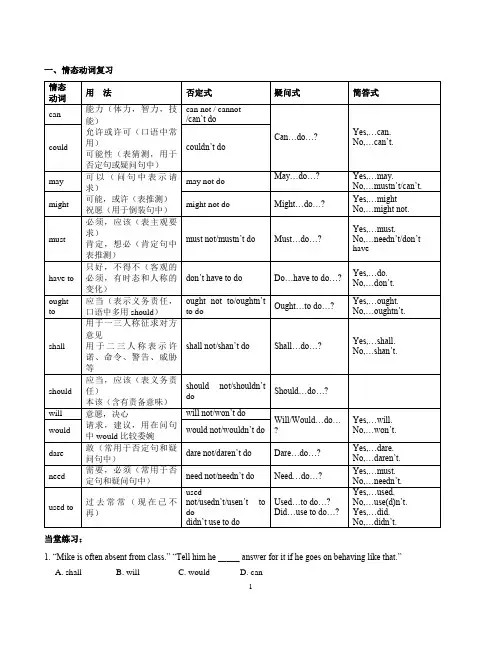
一、情态动词复习当堂练习:1. “Mike is often absent from class.” “Tell him he _____ answer for it if he goes on behaving like that.”A. shallB. willC. wouldD. can1【参考答案】A【思路解析】shall 用作情态动词主要有以下两个用法:1)用于疑问句中征求意见。
如:Shall I help you?要不要我帮帮你?Shall I open the window?要我把窗子打开吗?2)用于陈述句中表示允诺、告诫、警告、威胁、命令、规定、必然性等(可用于各类人称)。
如:You shall suffer for this. 你会为此事吃苦头的。
(表威胁)Each competitor shall wear a number. 每个参赛者要戴一个号码。
(表规定)You shall hear everything as soon as you come. 你一来就可听到所有情况了。
(表允诺)2. You _______ pay too much attention to your reading skill, as it is so important.A. cannotB. shouldn’tC. mustn’tD. needn’t【参考答案】A【思路解析】cannot…too…是英语中一个十分有用的表达,意为“不可能太……,无论怎样……也不算过分,越……越……”。
如:You can’t be too careful. 你越仔细越好。
You can’t praise the book too much. 这本书值得大加赞扬。
We cannot work too much for the people. 我们为人民做工作是不可能做过头的。
A woman cannot have too many clothes. 女人买的衣服再多也不算多。
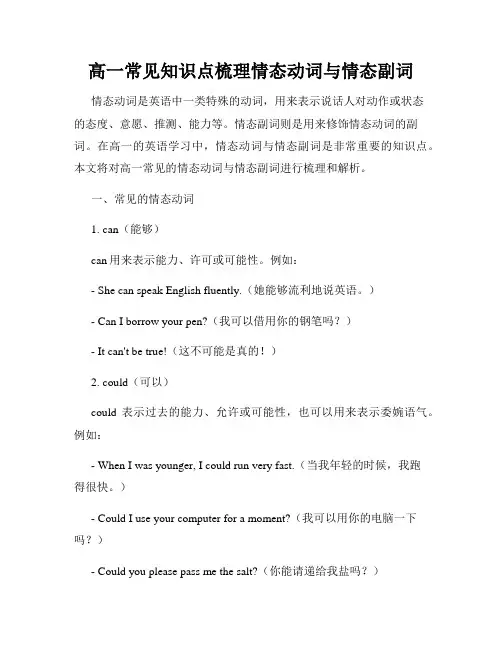
高一常见知识点梳理情态动词与情态副词情态动词是英语中一类特殊的动词,用来表示说话人对动作或状态的态度、意愿、推测、能力等。
情态副词则是用来修饰情态动词的副词。
在高一的英语学习中,情态动词与情态副词是非常重要的知识点。
本文将对高一常见的情态动词与情态副词进行梳理和解析。
一、常见的情态动词1. can(能够)can用来表示能力、许可或可能性。
例如:- She can speak English fluently.(她能够流利地说英语。
)- Can I borrow your pen?(我可以借用你的钢笔吗?)- It can't be true!(这不可能是真的!)2. could(可以)could表示过去的能力、允许或可能性,也可以用来表示委婉语气。
例如:- When I was younger, I could run very fast.(当我年轻的时候,我跑得很快。
)- Could I use your computer for a moment?(我可以用你的电脑一下吗?)- Could you please pass me the salt?(你能请递给我盐吗?)3. may(可能)may表示可能性、允许或请求的委婉语气。
例如:- It may rain tomorrow, so take your umbrella with you.(明天可能会下雨,所以记得带上雨伞。
)- May I go to the bathroom?(我可以去洗手间吗?)- May I have another piece of cake, please?(请问我可以再来一块蛋糕吗?)4. might(可能)might用来表示较小的可能性或建议。
例如:- It might rain later, so you should bring a raincoat.(天气可能会下雨,所以你应该带一件雨衣。
)- You might want to try the new restaurant downtown.(你可以试试市区的那家新餐厅。

高一英语情态动词专项训练及答案及解析一、单项选择情态动词1.It wasn 't right to me that such near neighbor s not know one another.A. could B.wouldC. should D.might【答案】 C【解析】【详解】考查情态动词。
句意:对我来说,很不正常,如此近的邻居居然不认识。
A. could 可能,能够; B. would 将;C. should 竟然; D. might 可能,也许。
should 作为情态动词,可以用来表示意外、惊喜或者在说话人看来是不可思议的,常常译为"竟会 "、 "居然" ,住的这么近的邻居居然不认识。
表示意外,所以答案选C。
【点睛】should 的用法1、should 作为情态动词 ,通常用来表示现在或将来的责任或义务,译作“应该”、“应当”这,时它可以和 ought to, be supposed to 互换使用 .例如: You should (= ought to ) tell your mother about it at once.2、should 作为情态动词 ,可以用在条件状语从句中 ,表示语气较强的假设 ,译作“万一”、“竟然”这,时也可将 should 置于从句之首 ,即将 should 放在主语前面 ,而省略从属连词 if。
例如: If you should fail to come, ask Mrs Chen to work in your place. (= Should you fail to come, ask Mrs Chen to work in your place. )3、should 作为情态动词 ,可以表示谦逊、客气、委婉之意 ,译为“可⋯⋯、”“倒⋯⋯”。
例如: I should say that it would be better to try it again.4、should 作为情态动词 ,可以用来表示意外、惊喜或者在说话人看来是不可思议的.尤其在以 why, who, how 等开头的修辞疑问句或某些感叹句中常常译为“竟会”、“居然”。
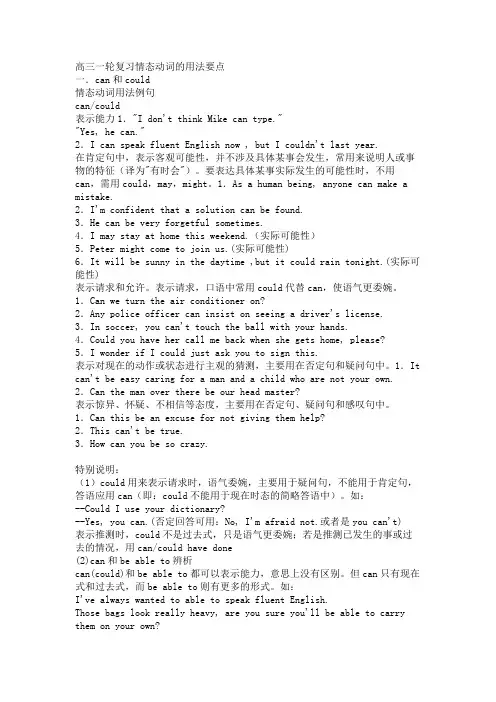
高三一轮复习情态动词的用法要点一.can和could情态动词用法例句can/could表示能力1."I don't think Mike can type.""Yes, he can."2.I can speak fluent English now , but I couldn't last year.在肯定句中,表示客观可能性,并不涉及具体某事会发生,常用来说明人或事物的特征(译为"有时会")。
要表达具体某事实际发生的可能性时,不用can,需用could,may,might。
1.As a human being, anyone can make a mistake.2.I'm confident that a solution can be found.3.He can be very forgetful sometimes.4.I may stay at home this weekend.(实际可能性)5.Peter might come to join us.(实际可能性)6.It will be sunny in the daytime ,but it could rain tonight.(实际可能性)表示请求和允许。
表示请求,口语中常用could代替can,使语气更委婉。
1.Can we turn the air conditioner on?2.Any police officer can insist on seeing a driver's license.3.In soccer, you can't touch the ball with your hands.4.Could you have her call me back when she gets home, please?5.I wonder if I could just ask you to sign this.表示对现在的动作或状态进行主观的猜测,主要用在否定句和疑问句中。
情态动词1. —Jane, why don’t you take a bite of the chocolate?—Well, I am on diet, if you __________know.A. mustB. shallC. wouldD. could【答案解析】A【详解】考查情态动词。
句意:——简,你为什么不咬一口巧克力呢?——好吧。
我在节食,如果你一定要知道的话。
A. must必须,一定;B. shall将要;C. would将会;D. could能够,可以。
此处if you must know为习惯表达,其中的must表示执意,即执意要做某事,表示“如果你必须知道,如果你一定要知道的话”。
故选A。
2. —Peter, you delivered a wonderful speech today.—Thanks, but I think I ______ more attention to my stage manners during that time.A. must payB. should payC. must have paidD. should have paid【答案解析】D【详解】考查情态动词+have done。
句意:---彼得,你今天的演讲很精彩。
---谢谢,但我认为在那段时间我应该多注意我的舞台礼仪。
should have done表示本应该做某事而实际上没有做某事。
由“but”可知,我那段时间本应该多注意我的舞台礼仪,而实际上并没有注意。
故选D项。
3. It’s nearly 7 o’clock. Jack ____________ be here at any moment.A. shallB. had toC. ought toD. have to【答案解析】C【详解】考查情态动词。
句意:现在已经七点钟了。
杰克应该会随时出现的。
ought to"应当",表示推测和可能性;shall常用于主语是第一人称的句子中,如果主语是第二、三人称,则表示"责备,警告"等;have to"必须",强调客观需要。
【英语】高一英语情态动词专项训练100(附答案)含解析一、单项选择情态动词1.My sister met him in the street yesterday afternoon, so he ______ your lecture. A.shouldn’t have attended B.couldn’t have attendedC.mustn’t have attended D.needn’t have attended【答案】B【解析】试题分析:考查情态动词用法。
Shouldn’t have done本不应该做某事,实际上却做了(虚拟语气);couldn’t have done不可能做某事(对过去情况的推测);needn’t have done本不需要做某事,实际上却做了(虚拟语气);句意:我的姐姐昨天下午在街上遇见了他,所以他不可能去听了你的演讲。
故B正确。
考点:考查情态动词用法点评:考本题是高考必考考点,一定要牢记句型意思。
must have done过去肯定做了某事。
should have done 本应该做而实际未做。
can’t have done 过去不可能做了某事;sh ouldn’t have done 本不应该做而实际做了。
need have done 本有必要做某事;needn’t have done 本没有必要做某事;注意没有mustn’t have done的形式。
2.I’m sorry, but you _____ go wrong. There’s no such man here.A.need B.can C.must D.will【答案】C【解析】【详解】考查情态动词。
句意:很抱歉,但是你一定是弄错了。
这儿没有这么个人。
A. need需要;B. can能够;C. must必须;D. will将会。
must指有把握的推测,“一定;必定”,结合下文There’s no such man here.可知一定是弄错了。
一、情态动词表推测1. 肯定的推测一般用must, should, may(might)或could(不用can),其中,must的语气最强,译为“肯定”、“准是”、“想必是”;should的语气次之,译为“很可能”、“应该”,指按常理推测;may (might),could的语气最弱,译为“也许”、“可能”。
①Helen _______ go on the trip with us but she isn’t quite sure yet. 2005年安徽卷)A. shallB. mustC. mayD. can②—I’ve taken someone else’s green sweater by mistake.—It ___ Harry’s. He always wears green. (2005年广东卷)A. has to beB. will beC. mustn’t beD. could be③I have lost one of my gloves. I _______ it somewhere.(2005年北京春季卷)A. must dropB. must have droppedC. must be droppingD. must have been dropped④If I ____ plan to do anything I wanted to ,I’d like to go to Tibet and travel through as much of it as possible. (2005年湖北卷)A. wouldB. couldC. had toD. ought to2. 否定推测分为两种情况:1)语气不很肯定时,常用may not, might not或could not,译为“可能不”、“也许不”。
You might just as well tell the manufacturer that male customers ______ not like the design of the furniture. (2004年上海春季卷)A. mustB. shallC. mayD. need2)否定语气较强时,则用can’t,译为“根本不可能”、“想必不会”,表示惊异、怀疑的感情色彩。
【英语】高一英语情态动词专项训练100(附答案)一、单项选择情态动词1.I often felt troubled in my teens and my grandma ________ comfort me, saying “Life is like that, dear”.A.would B.might C.should D.must【答案】A【解析】【详解】考查情态动词。
句意:在我十几岁的时候,我经常感到烦恼,我的奶奶会安慰我说,“生活就是这样,亲爱的”。
此处是would+动词原形,表示“过去总是做某事”。
故选A。
2.(2018·天津) I can't find my purse. I___________ it in the supermarket yesterday, but I'm not sure.A.should leave B.must have leftC.might leave D.could have left【答案】D【解析】【详解】考查情态动词表推测。
句意:我不能找到我的钱包了,昨天我有可能把它落到超市了,但我不确定。
根据句中时间状语yesterday可知,是对过去事情的推测,故用情态动词+ have done,再根据后句but I’m not sure.可知,此推测为不能肯定的推测,故用情态动词could,表示“可能”。
故选D。
【点睛】情态动词是每年高考的热点也是难点。
本题抓住两点:第一、时态。
根据句中时间状语可以判断出是对过去事情的推测,故用情态动词 + have done;如果是对现在事情的推测,才用情态动词+v原形。
第二、情态动词的选择。
must为肯定推测,表示“一定”,could为不肯定推测,表示“可能”,这样就能选出正确答案。
3.---Artistic people can be very difficult sometimes.---Well, you______know---you married one.A.might B.would C.shall D.should【答案】D【解析】【详解】考查情态动词词义辨析。
高一英语情态动词专项训练100(附答案)一、单项选择情态动词1.It has been announced that all the students ________ put on masks before going to school in case they are infected with SARS virus.A.shall B.will C.need D.may【答案】A【解析】【详解】【详解】考查情态动词。
句意:所有学生们应在去学校之前带上口罩以防感染非典病毒,这已经被宣布。
shall用于第二、第三人称,表示说话人给对方命令、警告、允诺或威胁,故选A 项。
2.I’m sorry, but you _____ go wrong. There’s no such man here.A.need B.can C.must D.will【答案】C【解析】【详解】考查情态动词。
句意:很抱歉,但是你一定是弄错了。
这儿没有这么个人。
A. need需要;B. can能够;C. must必须;D. will将会。
must指有把握的推测,“一定;必定”,结合下文There’s no such man here.可知一定是弄错了。
故选C。
3.—It’s already 11 o’clock , and he ______ have been here half an hour ago.—Maybe he got caught in the rain.A.must B.ought toC.may D.can【答案】B【解析】【详解】考查情态动词。
句意:已经11点了,他半小时前就该到了。
A. must have done必定做了…(表示对过去的推测);B. ought to have done 本应该做的;C. may have done可能已经做过某事;D. can have done本来可以做的(但没有做),根据题意,故选B。
情态动词情态动词是高考考查的重点语法项目之一,2005年全国17套高考试题对此都有考查。
下面就近几年来高考试题中出现的情态动词的考点进行归纳分析,以便同学们复习掌握。
一、情态动词表推测1. 肯定的推测一般用must, should, may(might)或could(不用can),其中,must的语气最强,译为“肯定”、“准是”、“想必是”;should的语气次之,译为“很可能”、“应该”,指按常理推测;may(might),could的语气最弱,译为“也许”、“可能”。
①Helen _______ go on the trip with us but she isn’t quite sure yet. (2005年安徽卷)A. shallB. mustC. mayD. can②—I’ve taken someone else’s green sweater by mistake.—It ___ Harry’s. He always wears green. (2005年广东卷)A. has to beB. will beC. mustn’t beD. could be③I have lost one of my gloves. I _______ it somewhere.(2005年北京春季卷)A. must dropB. must have droppedC. must be droppingD. must have been dropped④If I ____ plan to do anything I wanted to ,I’d like to go to Tibet and travel through as much of it as possible. (2005年湖北卷)A. wouldB. couldC. had toD. ought to2. 否定推测分为两种情况:1)语气不很肯定时,常用may not, might not或could not,译为“可能不”、“也许不”。
You might just as well tell the manufacturer that male customers ______ not like the design of the furniture. (2004年上海春季卷)A. mustB. shallC. mayD. need2)否定语气较强时,则用can’t,译为“根本不可能”、“想必不会”,表示惊异、怀疑的感情色彩。
①—Do you know where David is? I couldn’t find him anywhere.—Well. He ______ have gone far——his coat’s still here.(2005年湖北卷)A. shouldn’tB. mustn’tC. can’tD. wouldn’t②— Isn’t that Ann’s husband over there?— No, it _______ be him I’m sure he doesn’t wear glasses. (2004年全国卷Ⅰ)A. can’tB. must notC. won’tD. may not3. 疑问句中的推测,往往用can或could。
Mr. Bush is on time for everything. How ______ it be that he was late for the opening ceremony?(2001年上海春季卷)A. canB. shouldC. mayD. must4. 对已发生事情的肯定推测常用“must, may, might等+完成式”;否定推测常用“can, could, may, might等+完成式”。
①I was on the highway when this car went past followed by a police car. They _______ at least 150 kilometers an hour.(2005年重庆卷)A. should have been doingB. must have been doingC. could have doneD. would have done②He _______ have completed his work; otherwise, he wouldn’t be enjoying himself by seaside. (2005年北京卷)A. shouldB. mustC. wouldn’tD. can’t③—Tom is never late for work. Why is be absent today?—Something ________ to him. (2005年江西卷)A. must happenB. should have happenedC. could have happenedD. must have happened④ My sister met him at the Grand Theatre yesterday afternoon, so he_____ have attended your lecture.(2000年上海卷)A. couldn’tB. needn’tC. mustn’tD. shouldn’t二、“情态动词+完成式”1. “should(ought to)+完成式”表示本应该做某事而实际上没有做。
其否定式表示某种行为不该发生但却发生了。
①—I’ll tell Mary about her new job tomorrow.— You________ her last week. (2004年福建卷)A. ought to tell B. would have toldC. must tell D. should have told②Oh, I’m not feeling well in the stomach, I _____ so much fried chicken just now. (2002年上海春季卷)A. shouldn’t eatB. mustn’t have eatenC. shouldn’t have eatenD. mustn’t eat2. “could+完成式”表示本来能够做成某事的但结果没能做成,含有遗憾的意味。
He paid for a seat, when he ______ have entered free. (2005年山东卷)A. couldB. wouldC. mustD. need3. “needn’t+不定式的完成式”表示本来不必做某事而实际上做了某事。
例如:You needn’t have watered the flowers, for it is going to rain.你本不需要浇花的,因为天就要下雨了。
— Catherine, I have cleaned the room for you.— Thanks. You ______ it. I could manage it myself. (2005年福建卷)A. needn’t doB. needn’t have doneC. mustn’t doD. shouldn’t have done三、常见的情态动词1. shall用于一、三人称疑问句表示征求对方意见;用于二、三人称陈述句表示说话人给对方的命令、警告、允诺或威胁等。
①“The interest be divided into five parts, according to the agreement made by both sides,” declared the judge. (2004年重庆卷)A. mayB. shouldC. mustD. shall②—Excuse me, but I want to use your computer to type a report.— You ______ have my computer if you don’t take care of it. (2004年湖南卷)A. shan’tB. might notC. needn’tD. shouldn’t③— The room is so dirty. ______ we clean it?— Of course. (2003年北京春季卷)A. WillB. ShallC. WouldD. Do2. must用于疑问句,表示责备、抱怨的感情色彩,意思为“偏偏,偏要”;mustn’t表示禁止,是说话人强有力的劝告。
①John, look at the time. _______ you play the piano at such a late hour?(2005年全国卷Ⅲ)A. MustB. CanC. MayD. Need②Tom, you leave all your clothes on the floor like this!(2005年全国Ⅰ)A. wouldn’tB. mustn’tC. needn’tD. may not3. needn’t表示“没有必要”。
— Lucy doesn’t mind lending you her dictionary.— She ______. I’ve already borrowed one. (2005年湖南卷)A. can’tB. mustn’tC. needn’tD. shouldn’t4. would表示过去反复发生的动作或某种倾向。
When he was there, he ___ go to that coffee shop at the corner after work every day.(1996年上海卷)A. wouldB. shouldC. had betterD. might5. 表示经过努力而成功的某一次动作,只能用was/were able to,而不能用could。
The fire spread through the hotel very quickly but everyone _____ get out. (1997年全国卷)A. had toB. wouldC. was able toD. could6. 考查情态动词用作答语的情况①—Write to me when you get home.— _______. (2001年北京春季卷)A. I mustB. I shouldC. I willD. I can②— Could I call you by your first name?—Yes, you ______. (1998年上海卷)A. willB. couldC. mayD. might巩固练习:1. Michael ______ be a policeman, for he is much too short.A. needn’tB. can’tC. shouldD. may2. I told Sally how to get here, but perhaps I ____ for her.A. had to write it outB. must have written it outC. should have written it outD. ought to write it out3. Jack _____ yet, otherwise he would have telephoned me.A. mustn’t have arrivedB. shouldn’t have arrivedC. can’t have arrivedD. needn’t have arrived4. Sir, you ______be sitting in this waiting room. It is for women and children only.A. mustn’tB. can’tC. won’tD. needn’t5. A left-luggage office is a place where bags _______ be left for a short time, especially at a railway station.A. shouldB. canC. mustD. will6. — Is John coming by train?— He should, but he _____ not. He likes driving his car.A. mustB. canC. needD. may7. It has been announced that candidates _______ remain in their seats until all the papers have been collected.A. canB. willC. mayD. shall8. You can’t imagine that a well-behaved gentleman ______ be so rude to a lady.A. mightB. needC. shouldD. would9. —Don’t forget to come to my birthday party tomorrow. —_______.A. I don’tB. I won’tC. I can’tD. I haven’t10. I didn’t see her in the meeting-room this morning. She____ at the meeting.A. mustn’t have spokenB. shouldn’t have spokenC. needn’t have spokenD. couldn’t have spoken例题答案Key: C D B B Key: C Key: C A Key:A Key: B B D A Key: D CKey:A Key: B Key: D A B Key: A B Key: C Key: AKey:C Key:C C练习答案与解析1. B 从第二个分句“他太矮了”可以推知说话者持否定态度,needn’t意思是“没有必要”,与语境不符。